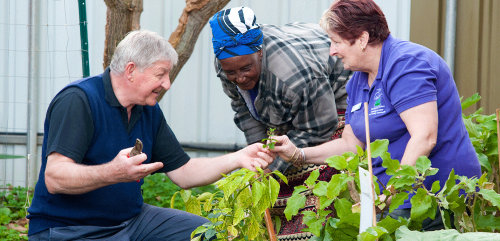We are committed to continually improving the wellbeing of all people living and working in South Australia. Our mission is making a difference so South Australia thrives, through fairness, opportunity and choice for all South Australians.
Below are our wide range of services and resources designed to aid individuals, families, communities and non-government organisations (NGO) within South Australia.
DHS Disability Services
DHS Disability Services is for people who need regular support to live independently at home.

Grants
Funding to improve community participation, wellbeing and quality of life for South Australians.

Cost of Living
South Australians on low or fixed incomes can get help with household and other expenses.

Child and Family Support
We help South Australian families by empowering them with knowledge, skills and professional support.

Carers
Carers provide unpaid ongoing support to family or friends with disability, age-related frailty or chronic illness.

NGO and Sector Support
Support for non-government organisations (NGOs) of all sizes, types, and sectors that work to improve the wellbeing of people in South Australia.

Aboriginal Peoples
We work in partnership with Aboriginal communities on a wide range of programs and services to support Aboriginal families and young people.

Youth
Ensuring young South Australians can access opportunities to contribute to our state’s social and economic prosperity.

Youth Justice
DHS supports young people in contact with the youth justice system to make positive choices in order to reduce reoffending and reconnect with family, community, and culture.

Women's Services
The Office for Women works toward achieving positive change for women by collaborating with women’s groups, community organisations and the private sector.

LGBTIQA+
DHS is committed to supporting Lesbian, Gay, Bisexual, Transgender, Intersex, Queer, Asexual and other sexually, gender and bodily diverse (LGBTIQA+) South Australians.

Community Connections
Supporting people to enhance their wellbeing by strengthening connections with communities, social networks, and services.

Exceptional Needs Unit
Supporting individuals and families who have multiple complex needs and risk factors.

Screening Checks
Screening checks contribute to creating safe environments for children and other vulnerable people.

Interpreting and Translating Centre
Access qualified translators and interpreters experienced in most of the community and commercial languages of South Australia.

Gambling Harm
Gambling can be harmful in ways that disrupt your life, your loved ones and those close to you. There is support available.

Volunteering
Volunteering is a vital part of the South Australian way of life — generating great community spirit and helping to make our neighbourhoods welcoming, safe and inclusive.

Homelessness
Homelessness can affect anyone. We are committed to getting the best outcomes for people living without a home or at risk of becoming homeless.

Specialist Disability Accommodation
DHS provides a range of Specialist Disability Accommodation (SDA) houses for South Australians with disability.

